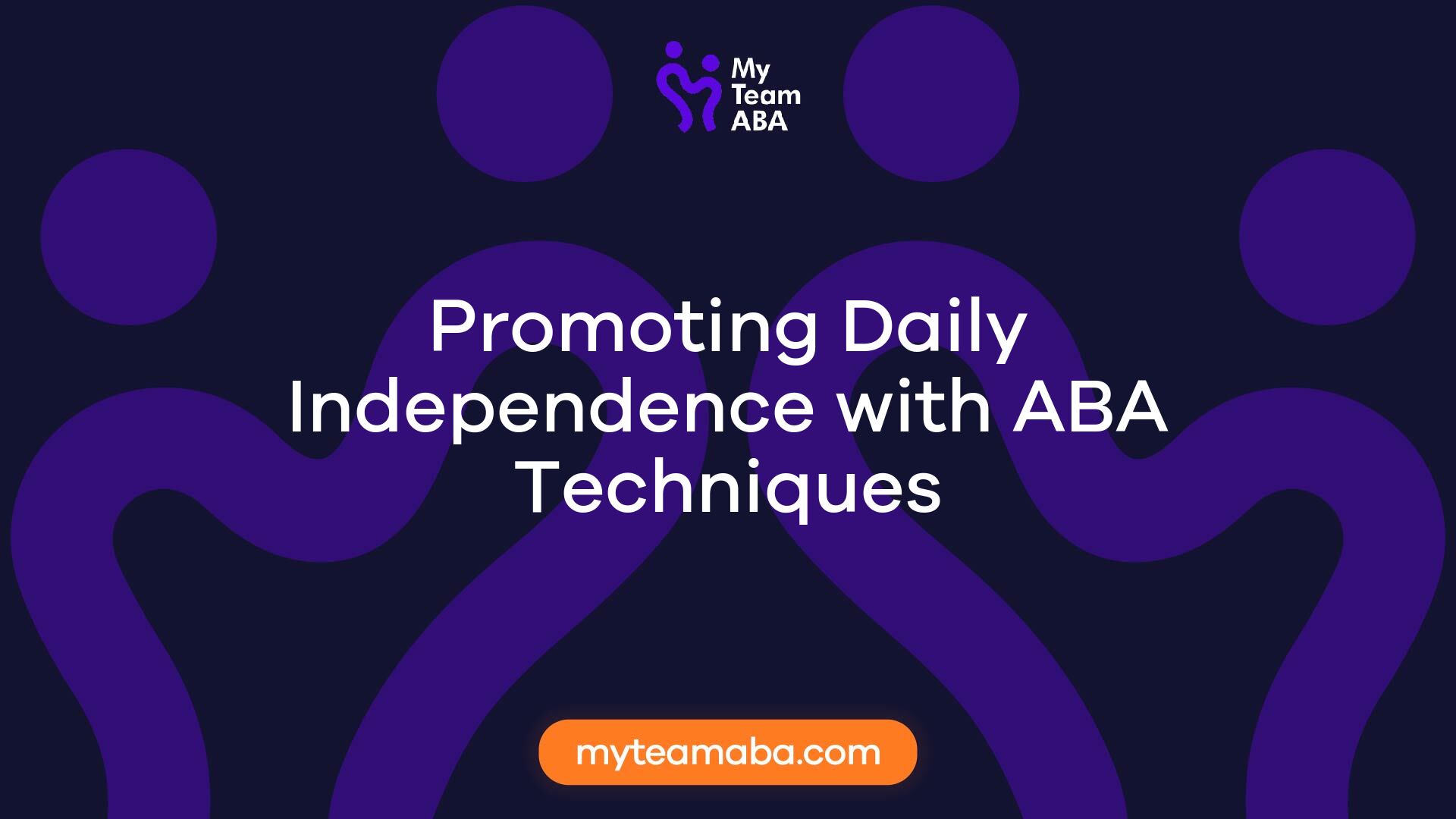Promoting Daily Independence with ABA Techniques
March 4, 2025
Discover the power of promoting daily independence with ABA techniques for enhanced autonomy and real-life skills.

Understanding ABA Therapy
When it comes to building independence through ABA therapy, systematic approaches play a vital role in empowering individuals with the skills needed for daily living. ABA therapy utilizes structured and evidence-based techniques to break down complex tasks into manageable steps, especially beneficial for individuals with autism spectrum disorder (ASD). By employing reinforcement strategies and focusing on specific goals, ABA therapy aims to enhance independence and improve social inclusion, ultimately leading to a better quality of life.

Systematic Approaches and Independence
EmpowerBH emphasizes that ABA therapy's systematic approaches are crucial for teaching individuals how to navigate daily challenges effectively. By breaking down skills into smaller, achievable steps, ABA therapy enables individuals to learn and practice tasks progressively, fostering a sense of accomplishment and independence. This systematic method allows for targeted intervention tailored to the individual's unique needs, promoting successful skill acquisition and generalization.
Assessment and Individualized Goals
An integral part of utilizing ABA therapy to promote daily independence is the initial assessment and goal setting process. As highlighted by EmpowerBH, a comprehensive assessment conducted by a trained ABA therapist is the foundation for developing individualized intervention plans. This assessment helps identify the individual's strengths, challenges, and areas for growth. Subsequently, specific and measurable goals are established, focusing on enhancing daily living skills that align with the individual's abilities and aspirations.
In addition to individuals with autism, ABA techniques have also proven to be effective for individuals with conditions such as attention-deficit/hyperactivity disorder, intellectual disabilities, Down syndrome, and developmental delays. This highlights the adaptability and efficacy of ABA interventions in addressing a diverse range of developmental disorders, as noted by My Team ABA.
By implementing ABA therapy with a focus on systematic approaches, personalized assessment, and goal setting, individuals with developmental disabilities can gain valuable skills to promote independence in their daily lives, enhance their integration into the community, and improve their overall quality of life.
Techniques in ABA Therapy
In the realm of building independence through ABA therapy, specific techniques play a vital role in enhancing daily living skills and fostering autonomy in individuals. Two key techniques commonly used in ABA therapy for this purpose are task analysis for daily living skills and positive reinforcement strategies.
Task Analysis for Daily Living Skills
Task analysis within ABA therapy is a systematic approach employed by therapists to deconstruct complex daily living skills into smaller, manageable steps. By breaking down tasks such as self-care, hygiene routines, meal preparation, and household chores into smaller components, it becomes easier to identify areas where individuals may require support and assistance. Task analysis helps in ensuring skill mastery by teaching individuals essential routines like personal hygiene, including brushing teeth, resulting in enhanced autonomy in performing everyday tasks effectively.
When using task analysis, therapists focus on teaching these skills step-by-step, making sure each component is understood and executed correctly before moving on to the next. By breaking tasks into manageable steps, individuals can gradually progress towards independence in various aspects of daily life.
Positive Reinforcement Strategies
Positive reinforcement is a fundamental principle in ABA therapy aimed at increasing the likelihood of desired behaviors. In the context of enhancing daily living skills, positive reinforcement strategies are pivotal in motivating individuals to engage in, learn, and maintain these skills. By providing positive feedback, rewards, or praise when individuals demonstrate desired behaviors or successfully complete tasks, therapists encourage the reinforcement of those behaviors.
In ABA therapy, positive reinforcement strategies involve utilizing various techniques such as verbal praise, tokens, stickers, or other incentives tailored to the individual's preferences. Through the consistent application of positive reinforcement, individuals are more likely to internalize learned behaviors and transfer them from therapy settings to real-life situations. Reinforcement helps in solidifying skills, promoting independence, and fostering a sense of accomplishment and self-efficacy.
By integrating task analysis for daily living skills and positive reinforcement strategies, ABA therapists effectively equip individuals with the tools and motivation to develop practical life skills essential for promoting daily independence and self-sufficiency. These techniques not only facilitate skill acquisition but also nurture a sense of empowerment and confidence in individuals as they navigate various aspects of their daily lives.
Data-Driven Decision Making
Data collection is a fundamental aspect of ABA therapy, particularly when focusing on promoting daily independence. By systematically collecting data during therapy sessions, ABA therapists can assess progress, track performance, and make informed decisions to tailor interventions. The importance of data collection cannot be overstated in the context of enhancing independence through ABA techniques.
Importance of Data Collection
In ABA therapy, data collection serves as the backbone for evaluating the effectiveness of interventions and measuring the progress of individuals, especially those working towards daily living skills [1]. By documenting behaviors, responses to prompts, and skill acquisition, therapists can analyze trends, identify patterns, and quantify improvements over time.
Data collection allows for the identification of specific areas where an individual may need additional support, guidance, or reinforcement. It provides valuable insights into the effectiveness of teaching strategies, helping therapists make data-driven decisions to optimize the individual's learning experience.
Monitoring Progress and Adjustments
In ABA therapy, monitoring progress is a collaborative effort between therapists, caregivers, and individuals undergoing treatment. Regular review of data enables stakeholders to assess performance, celebrate achievements, and identify areas for further development.
Through data analysis, therapists can determine whether the current interventions are effective in fostering independence and daily living skills [3]. Should adjustments be necessary, such as modifying teaching methods, adjusting reinforcement strategies, or introducing new tasks, data-driven insights provide the basis for informed decision-making.
Data-driven decision making in ABA therapy ensures that interventions are tailored to meet the individual's specific needs and goals. By leveraging the information gathered through systematic data collection, therapists can empower individuals to progress towards greater autonomy, independence, and integration within their communities.
ABA Therapy for Autonomy
In the realm of building independence through ABA therapy, one of the key focuses is on enhancing daily living skills to promote autonomy, particularly among adults. ABA therapy, rooted in behavioral psychology and utilized since the 1960s, aims to modify behavior through systematic and structured techniques to foster independence in individuals.
Focus on Daily Living Skills
For adults with Autism Spectrum Disorder (ASD), ABA therapy emphasizes the development of essential daily living skills. These skills encompass a wide range of tasks that are fundamental for navigating daily life with confidence and self-sufficiency. Through targeted interventions and positive reinforcement strategies, individuals can learn crucial skills like emotional regulation, vocational training, and household management.
By focusing on tasks such as personal hygiene, meal preparation, and household upkeep, ABA therapy equips individuals with the necessary tools to enhance their quality of life and promote self-esteem. These practical life skills play a vital role in fostering independence and facilitating integration into society.
Enhancing Autonomy for Adults
A significant goal of ABA therapy is to ensure that the acquired skills are not confined to therapy sessions but are transferable to real-world scenarios. Therapists work diligently to generalize these skills, enabling individuals to apply them in diverse environments, whether at home, school, work, or within the community. This focus on generalization empowers individuals to exhibit greater independence across multiple facets of life, promoting autonomy and self-reliance [6].
ABA therapy serves as a beacon of hope for individuals with ASD, offering them the support and guidance needed to navigate the complexities of the world. By equipping them with the skills to lead independent lives, ABA therapy paves the way for a journey of self-discovery, accomplishment, and a sense of empowerment [6].
Supporting Diverse Needs
When it comes to promoting daily independence with ABA techniques, ABA therapy has showcased its versatility in benefiting individuals with various conditions beyond autism. These individuals encompass a spectrum of needs, including attention-deficit/hyperactivity disorder, intellectual disabilities, Down syndrome, and developmental delays, among others. The adaptability and effectiveness of ABA techniques have been instrumental in addressing a wide range of developmental disorders and promoting autonomy in daily living.
Benefits for Various Conditions
Individuals with conditions extending beyond autism have found substantial benefits through tailored ABA interventions, as highlighted by My Team ABA. Through personalized ABA strategies, individuals with diverse needs have experienced improvements in social behaviors, communication skills, and adaptive behaviors. ABA therapy stands as a beacon of hope for these individuals, providing them with the necessary skills and tools to navigate life's complexities, fostering independence and a sense of accomplishment, as emphasized by Dream Big Children's Center.
ABA therapy is a structured and evidence-based intervention recognized for its ability to enhance cognitive abilities, language development, socialization, adaptive behavior, and reduce problem behaviors in individuals with various conditions. The targeted focus on developing adaptive behaviors through ABA therapy equips individuals with essential life skills that facilitate independence and daily functioning, creating a significant impact on their overall well-being as stated by All Star ABA.
Adaptable ABA Interventions
By adopting evidence-based practices, ABA therapists integrate the best available evidence, client values, and individual contexts to deliver effective services tailored to meet the unique needs of each individual. This client-centric approach enables ABA therapists to design interventions that align with the personal goals and aspirations of their clients, fostering independence and autonomy in daily life, as highlighted by All Star ABA.
The ability of ABA therapy to adapt to the diverse needs of individuals with various conditions underscores its effectiveness in improving quality of life and promoting independence across a broad spectrum of developmental disorders. The tailored nature of ABA interventions ensures that individuals receive the support and guidance necessary to achieve their goals, fostering a sense of empowerment and self-reliance in their daily lives.
Evolution of ABA Therapy
Historical Background
Originating in the 1960s, Applied Behavior Analysis (ABA) therapy emerged as a pivotal approach to assist children with autism. Utilizing principles of behavioral psychology, ABA focuses on modifying behavior through systematic and structured techniques to promote independence in individuals [5]. By instilling valuable life skills and fostering self-reliance, ABA has played a crucial role in empowering individuals to lead more autonomous lives.
Impact Over the Years
Over the years, ABA therapy has shown significant efficacy in enhancing a wide array of skills and behaviors in individuals with Autism Spectrum Disorder (ASD). Studies have demonstrated improvements in cognitive abilities, language development, socialization, and adaptive behavior, while also effectively reducing problem behaviors. ABA therapy focuses on nurturing adaptive behaviors, equipping individuals with essential life skills that facilitate independence and daily functioning [7].
While numerous interventions based on ABA have been successful in benefiting individuals with ASD, a meta-analysis highlighted some challenges in comparing the effectiveness of ABA with other interventions such as Early Start Denver Model (ESDM), Picture Exchange Communication Systems (PECS), and Discrete Trial Training (DTT). The outcomes of these interventions underscored the importance of tailored approaches to meet the unique needs of individuals with ASD [8].
The evolution of ABA therapy continues to shape the landscape of interventions for individuals with autism, emphasizing the significance of personalized strategies that promote independence, self-sufficiency, and enhanced quality of life. Through its historical journey and impactful outcomes, ABA therapy remains a fundamental tool in supporting individuals on their path to autonomy and lifelong success.
Criticism and Adaptations
Despite the effectiveness of Applied Behavior Analysis (ABA) therapy in promoting independence and life skills, it is not without criticism. Recognizing and addressing these concerns is essential for the continuous improvement and adaptation of ABA techniques to better suit individual needs.
Addressing Concerns
One of the primary criticisms of ABA therapy involves its historical focus on eradicating specific behaviors rather than emphasizing skill-building. This critique has raised concerns that the intensive focus on behavior modification may overshadow the development of essential independent living skills. Critics argue that ABA should shift towards a more holistic approach that nurtures skills supporting autonomy and self-reliance, rather than solely targeting behaviors.
To address these concerns, practitioners are actively adapting their practices within the realm of ABA therapy. By incorporating a more individualized and holistic approach, therapists aim to tailor interventions to each individual's unique needs and goals. This shift towards a more personalized and comprehensive methodology allows for a more well-rounded development that encompasses not only behavior management but also the cultivation of essential daily living skills.
Holistic and Individualized Approaches
In response to criticism, the evolution of ABA therapy has led to a greater emphasis on holistic and individualized approaches. Practitioners are increasingly recognizing the importance of focusing on skills that are essential for fostering independence and self-sufficiency in individuals undergoing therapy.
An important aspect of this shift involves considering evidence-based practices (EBP) in ABA therapy. EBP involves integrating the best available evidence, client values, and contextual factors to inform decision-making and provide effective services. By incorporating client values and context into therapy sessions, ABA therapists can tailor interventions to align with the client's personal goals and aspirations. This approach ensures that therapy is not solely focused on modifying behaviors but also on empowering individuals to develop the necessary skills to lead independent and fulfilling lives.
By addressing criticism and adapting practices to embrace holistic and individualized approaches, ABA therapy continues to evolve and improve in its mission to promote independence and autonomy for individuals with developmental disabilities. Through ongoing refinement and adaptation, ABA therapy aims to provide a more comprehensive and empowering experience that equips individuals with the skills needed to thrive in daily life.
Promoting Independence
To attain greater autonomy and integrate into the community, individuals with developmental disabilities require the mastery of daily living skills. These skills are fundamental for sustaining independence and improving the quality of life. Applied Behavior Analysis (ABA) therapy, an evidence-based approach, plays a pivotal role in teaching these skills to individuals with developmental disabilities, leveraging behavior science principles to reinforce positive behaviors and diminish negative ones.
Skills Transferability
A crucial objective of ABA therapy is ensuring that the skills acquired during therapy sessions can be applied across various real-life settings. Therapists focus on generalizing these skills, enabling individuals to utilize them in different environments, whether at home, school, work, or within the community. This emphasis on transferability promotes enhanced independence and versatility, allowing individuals to navigate multiple facets of life successfully [6].
Real-Life Application
ABA therapy serves as a beacon of hope for individuals with Autism Spectrum Disorder (ASD) who aspire to achieve independence in their daily lives. By equipping individuals with the necessary skills and tools to navigate the complexities of the world, ABA therapy fosters autonomy and a sense of accomplishment. These acquired skills extend beyond therapy sessions and help individuals successfully maneuver through various real-life scenarios, empowering them to lead fulfilling lives [6].
Incorporating ABA techniques into everyday life is pivotal for individuals with developmental disabilities. These techniques can be applied across different domains, including the workplace and social environments, to enhance productivity, communication, and appropriate behavior. By employing ABA principles, individuals with autism can confidently navigate diverse situations throughout their lives, promoting independence and self-sufficiency.
References
[1]: https://www.empowerbh.com/blog/how-aba-therapy-helps-build-daily-living-skills/
[2]: https://www.myteamaba.com/resources/aba-strategies-for-daily-autonomy
[3]: https://chicagoabatherapy.com/resources/gloassry/daily-living-skills/
[4]: https://www.yellowbusaba.com/post/aba-therapy-and-independent-living-skills
[5]: https://www.magnetaba.com/blog/aba-therapy-and-independent-living-skills
[6]: https://dreambigchildren.com/blog/aba-therapy-and-the-pursuit-of-independence-in-daily-life/
[7]: https://www.allstaraba.org/aba-therapy-research-studies
